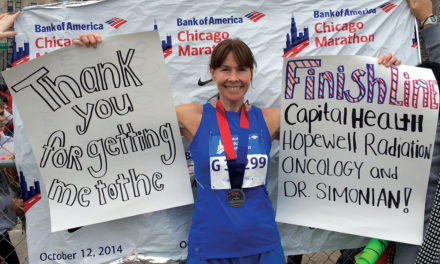New Jersey First Lady Tammy Murphy is leading the charge to combat the state’s maternal and infant mortality problem. Her efforts are creating a road map as other states look to address this complicated and important crisis in America.
When New Jersey First Lady Tammy Murphy saw the report in 2017 that the state was ranked near the bottom for maternal and infant mortality in the United States, she was deeply concerned. But that feeling soon gave way to a gut-level desire to change it. She brainstormed with Governor Phil Murphy—her husband of 28 years—as well as some of her advisors, and she determined that this crisis was going to be an area where she invested a great deal of her time and resources. She and her team began the framework for what became Nurture NJ—an initiative tasked with creating a strategic plan to address the systemic and societal issues causing maternal and infant mortality.
There was just one problem. Murphy had no idea at the time just how complex and confounding the issue really was. “At the time, I naïvely thought that motherhood and infant mortality must just have to do with access to health care. I thought we were somewhat missing the mark from that perspective, and if we could get more people to have their prenatal visits and help them gain access to quality health care, we would be in much better shape,” she says. But as she began to dig deeper, the First Lady learned the crisis was caused by a multitude of factors that were rooted in systemic injustice. “Here we are, nearly 5 years later, working on this every single day.”
Murphy and her team began meeting with people around the state—anyone they thought could be key stakeholders in the space of maternal and infant mortality, including mothers, doctors, doulas and midwives, nonprofits, insurance companies, and health care systems. “Once we started realizing the disparities were due to structural racism and historic challenges that we face as an entire nation alongside the state, it became clear that this was a complicated space to work in,” she says. “But it’s something we must fix.”
A Personal Challenge
Instead of being scared away by the magnitude of the challenge, the First Lady doubled down. After a career in finance, working for years at at Goldman Sachs, Smith Barney, and Investcorp, then later in the nonprofit arena, she felt prepared to roll up her sleeves and get to work to make meaningful change.
On Maternal Health Awareness Day 2019, Murphy officially launched Nurture NJ, a statewide awareness campaign committed to reducing maternal and infant mortality. She devoted herself to building an infrastructure and bringing together what ultimately became 21 different departments and agencies to identify the issues and offer practical solutions. “[Maternal and infant mortality] touches corrections, environmental protection, transportation, childcare, food security, and access to the Internet and WiFi.
It touches workforce development. This is a major structural reform that’s needed across a whole host of areas,” Murphy says. “In the beginning, I’m not sure if anybody took me seriously or thought that I was going to dig in here. But it’s been a real passion for me because I know that but for the color of my skin, I could have suffered the same outcomes. And Josh, Emma, Charlie, and Sam—our four kids—are the most important things we have.”
Over the past 4-plus years, the First Lady and her team have worked diligently to bring awareness to the maternal and infant mortality crisis, which she says was a difficult task because many people didn’t even know there was a problem. During that timeframe, Governor Phil Murphy has signed 43 pieces of legislation related to the issue.
In January 2021—even as the global pandemic took up so much time and energy—the First Lady unveiled the Nurture NJ Maternal and Infant Health Strategic Plan, which is the blueprint intended to reduce New Jersey’s maternal mortality rates by 50 percent over 5 years and eliminate racial disparities in birth outcomes. “The Strategic Plan gives us 70 actionable steps we can take to correct the trajectory. There’s a whole host of things we’ve done, and I would say it’s not going to be any singular item that I’m most proud of. It is going to be when we make New Jersey the safest and most equitable place in the country to deliver and raise a baby—that’s what we’re trying to do.”
In the beginning, I’m not sure if anybody took me seriously or thought that I was going to dig in here. But it’s been a real passion for me because I know that but for the color of my skin, I could have suffered the same fate.

New Jersey First Lady Tammy Murphy is wearing a dress owned by her mother, Jean Medway Snyder.

New Jersey First Family (from left): Gov. Phil Murphy, Tammy Murphy, and children Sam, Emma, Josh, and Charlie

18-Day Courtship, 28-Year Marriage
Governor Phil Murphy and First Lady Tammy Murphy met in January 1987 at the University of Virginia. They both got jobs at Goldman Sachs and knew each other as colleagues and acquaintances. Seven years later, they went on their first official date, dinner at Hilaire restaurant in London. Just 18 days after that, they decided to get married.
Now, 28 years, four kids, three dogs, a bird, and a fish later, the First Lady says they just fit together. “Both of us had been in serious relationships and then both of us had been single for a while. I don’t know what happened, but we just clicked,” she says. “We had a lot of the same friends. We understood the same language. Our personalities meshed. I cannot tell you what ‘happened,’ but we just thought that it would work, and thank God it did work. And still does.”
Trending Upward
Despite all the hard work to build and launch Nurture NJ, the statistics initially looked even more grim, mainly because studies look to the past, a concept known as “lagging indicators.” After launching Nurture NJ, the state actually dropped from 45th to 47th in maternal and infant mortality. But now—more than 5 years in—the numbers are starting to improve significantly. Last November, the March of Dimes released a new report, which showed the national trend deteriorating, but highlighted New Jersey’s numbers as a bright spot.
In the report, New Jersey was revealed to be one of only four states that improved preterm birth rates, a key indicator of the health of both mother and baby, raising a grade from a C+ to a B-. When evaluating preterm birth rates across the 53 states and territories reviewed, 47 worsened, one stayed the same, and only four improved: Montana, North Dakota, Kansas, and New Jersey.
While the First Lady knew they were making great strides through anecdotal evidence and through major gains in awareness of the problem, seeing the data was reassuring.
The First Lady’s statement in response to the March of Dimes report reflected her passion and a sense of urgency. “I have spent 5 years listening to the cry for maternal justice grow louder from mothers who have lost their babies—or very nearly their own lives, fathers who have lost their life partners, and countless women of color who have told tragically similar stories…I am optimistic that through the work of Nurture NJ we have started moving the needle by dismantling silos, building trust, developing groundbreaking policy, and amplifying the voices of mothers affected by this crisis. While I am thrilled to see our numbers progressing in the right direction, I am equally alarmed by the number of states which have declined. It is my hope that the ongoing efforts in New Jersey and the Nurture NJ Strategic Plan can serve as a model for all states and we can continue to refine our plan as we learn best practices from other states as well.”
According to the Nurture NJ Strategic Plan, the disparities in maternal and infant outcomes are not the result of differences in genes or behavior, but of the variety of historic, social, economic, and health environments experienced by Black and Brown women. Therefore, to fully confront the issue, the plan suggests that systems in New Jersey need to be transformed to build racial equity infrastructure and inspire broad engagement and collaboration to achieve a collective impact on health. Murphy knows the incredible challenges that lie ahead, but she brings determination, tireless research, and the support of leading experts across the country who truly understand this space. “I feel like we have a real chance, and I’m so thrilled Phil won a second term [as governor] because that gives us another chunk of time to really move the needle in motherhood and infant mortality in New Jersey and across the nation.”





